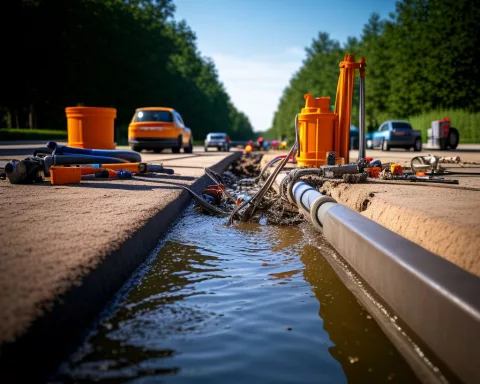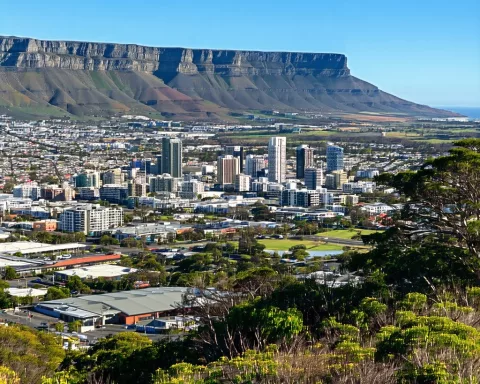Cape Town’s Water and Sanitation Directorate has announced a pre-scheduled maintenance routine, including zero-pressure tests and conditional assessments, to ensure the seamless operation of the city’s water supply network. The maintenance schedule will cause temporary disruptions in the water supply across various locations, but the ultimate goal is to tackle unaccounted water issues and safeguard future continuity. The city urges residents to be well-informed and prepared, storing sufficient water beforehand and staying informed about maintenance work through official channels.
What is the water supply maintenance schedule in Cape Town?
The city’s Water and Sanitation Directorate conducts a pre-scheduled maintenance routine, including zero-pressure tests and conditional assessments to ensure the seamless operation of the city’s water supply network. The maintenance schedule involves intentional disruptions in the water supply spanning various locations, causing temporary inconveniences for residents. The ultimate goal is to safeguard the future continuity of water supply by tackling unaccounted water issues.
The Necessary Interruption
As we approach the vibrant month of May, witnessing the onset of summer, the city’s Water and Sanitation Directorate is gearing up for an extensive and carefully organized maintenance schedule. From May 27 to 30, 2024, there will be intentional disruptions in the water supply spanning various locations. Although this may cause some inconvenience, it is a necessary measure to ensure the long-term wellbeing of the city’s residents.
The pre-scheduled maintenance routine involves conducting zero-pressure tests (ZPT) along with conditional assessments. The primary goal is to ensure the seamless operation of the city’s water supply network. Claremont, Rondebosch, and Kenilworth are the areas scheduled for undergoing these tests on May 28 and May 30. These tests, part of the pressure management technology installation process, play a crucial role in identifying unmapped water inflows prior to setting up smart pressure-reducing valves (PRVs).
However, during the testing phase, residents may experience a decrease in water pressure or possibly a temporary halt in water supply. The unpredictability in these interruptions is a result of the intricate network of water supply systems in the city.
Conditional Testing and Its Impact
Meanwhile, conditional testing is carried out to evaluate the effectiveness of the pressure-reducing valves in the city’s water supply network. This pivotal procedure is aimed at prolonging the pipeline’s lifespan and reducing water wastage due to pipe bursts. Despite the possibility of pressure oscillations, attempts will be made to mitigate their effects. This is a critical component of the City’s Water Demand Management Strategy, which aims to minimize the risk of pipe bursts and water wastage.
Maintenance procedures also involve a series of installations, mending, and replacements of pipes and valves. Residents in Llandudno, Gordon’s Bay, Oakdale-Bellville, Montclair-Somerset West, and certain parts of Southfield are encouraged to store sufficient water beforehand as a preventive measure.
On May 27, two valves in the pressure reducing valve (PRV) chamber situated on the main water supply pipeline to Llandudno will undergo replacement. The area will be supplied through a bypass while assessing the PRV which will be temporarily removed until May 30. Similarly, PRV installations will occur in Gordon’s Bay on May 28, and in Oakdale-Bellville and Montclair-Somerset West on May 30, causing temporary water supply disruptions.
Moreover, in Southfield, construction work related to the main water supply will temporarily interrupt water supply from 08:00 to 18:00 on May 30.
Resident Understanding and Preparedness
The city deeply acknowledges the potential inconvenience these planned disruptions may cause to its residents and is grateful for their understanding. It emphasizes that these planned outages are part of a proactive infrastructure maintenance and upgrade program. The ultimate goal of this program is to safeguard the future continuity of water supply by tackling unaccounted water issues.
It is crucial for the residents to be well-aware of these larger-scale planned water supply disruptions. The city assures its residents that every maintenance task has been planned in detail to minimize disruptions. However, sometimes maintenance work may be more complex than initially anticipated, leading to extended periods of disruption. After the restoration of water supply, residents may notice temporary discoloration or cloudiness in the water due to trapped air in the pipes. However, this should clear upon allowing the water to stand. Residents are advised to stay informed about the maintenance work through the @CityofCTAlerts.
In anticipation of the planned water supply disruptions, residents are recommended to store sufficient water in clean, sealed containers. Also, keeping the taps shut when the water supply is restored can prevent potential water loss or damage.
In conclusion, while these disruptions may cause temporary inconveniences, they are essential for ensuring an uninterrupted and efficient water supply in the long run. The city’s thorough planning and execution, coupled with the residents’ understanding and preparedness, are key to a successful maintenance period.
1. What is the water supply maintenance schedule in Cape Town?
The Water and Sanitation Directorate conducts a pre-scheduled maintenance routine, including zero-pressure tests and conditional assessments, to ensure the seamless operation of the city’s water supply network. The maintenance schedule involves intentional disruptions in the water supply spanning various locations, causing temporary inconveniences for residents. The ultimate goal is to safeguard the future continuity of water supply by tackling unaccounted water issues.
2. When will the maintenance schedule take place?
From May 27 to 30, 2024, there will be intentional disruptions in the water supply spanning various locations.
3. What is the purpose of the zero-pressure tests?
The primary goal of the zero-pressure tests is to identify unmapped water inflows prior to setting up smart pressure-reducing valves (PRVs).
4. How can residents prepare for the maintenance schedule?
Residents are recommended to store sufficient water in clean, sealed containers and keep the taps shut when the water supply is restored to prevent potential water loss or damage.
5. How can residents stay informed about the maintenance work?
Residents are advised to stay informed about the maintenance work through the @CityofCTAlerts.
6. What should residents expect after the restoration of water supply?
Residents may notice temporary discoloration or cloudiness in the water due to trapped air in the pipes. However, this should clear upon allowing the water to stand.












